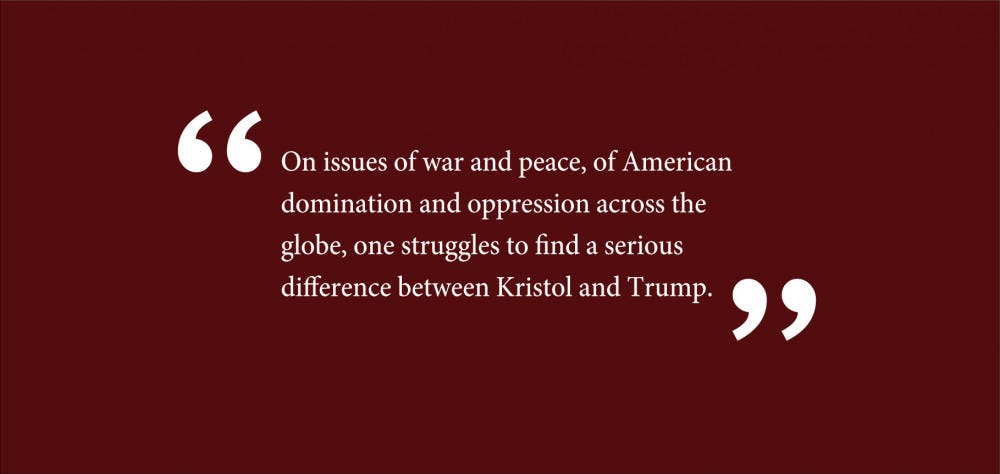Tonight at 5:30 p.m., Brown will welcome right-wing media personality Bill Kristol to campus for a discussion on the future of conservatism in America. Kristol, former editor of the now defunct neoconservative journal The Weekly Standard and a prominent proponent of the Iraq War, has experienced something of a revival since aligning himself very publicly against fellow right-winger President Trump. Though quietly removed from public discourse in the aftermath of the Bush administration, Kristol is now regularly heard on supposedly liberal outlets, like MSNBC, calling for a return to sensible conservatism away from a poisonous and racist Trump insurgency. Yet, on issues of war and peace, of American domination and oppression across the globe, one struggles to find a serious difference between Kristol and Trump. During Kristol’s visit, the Brown community should take note both of the striking similarities between Kristol and Trump and of Kristol’s lifelong defense of criminal American wars.
Formerly chief of staff to Vice President Dan Quayle, Kristol went on to co-found the influential neo-conservative think tank Project for a New American Century in 1997. PNAC’s members, including Dick Cheney, Donald Rumsfeld, Paul Wolfowitz and Elliott Abrams, called on the United States to adopt a “Reaganite policy of military strength and moral clarity.” This project was presumably inspired by the United States’ campaign of state terrorism waged in Latin America throughout the 1980s, which made Reagan the first president to be condemned by the International Court of Justice in 1986. In 2000, PNAC released “Rebuilding America’s Defenses,” a report which argued for American military dominance across the globe, especially in Iran and Iraq, the latter of which the report includes in “the American perimeter.”
Iraq remained Bill Kristol’s favorite target throughout the early 2000s. Speaking on ABC’s “Nightline” fifteen days before the U.S. invasion, Kristol told Ted Koppel that “We’ll be vindicated when we discover the weapons of mass destruction and when we liberate the people of Iraq.” A charitable observer might forgive Kristol for initially believing that the effects of the American invasion would be “very healthy,” but little charity can be afforded to him as he continued to ardently support the war even after U.N. Secretary General Kofi Annan called it “illegal” and as Iraqi civilian deaths climbed to at least 165,000, according to Brown’s Costs of War Project. Nevertheless, Kristol steadfastly supported this illegal and immoral war, which journalist Patrick Cockburn called “the earthquake whose aftershocks we still feel.”
Kristol and his neoconservative allies were gradually shunned from polite society as Americans grew war-weary at the end of the Bush years. But a neoconservative renaissance is taking place today as the David Frums and Max Boots of the world join with liberals in resisting Trump.
But, in Kristol’s case, what exactly is he resisting? Both he and Trump supported the Iraq war; though Kristol’s PNAC traditionally justified its support by citing “American interests in the region” as opposed to Trump’s more honest interest in “oil.” Both Kristol and Trump peddle the tawdriest sort of American myopia with Trump using the expression “America first” and Kristol’s PNAC using the politer “promotion of American principles abroad.” Both Kristol and Trump were staunch critics of the Iran Nuclear Deal, which Trump called “a horrible one-sided deal” and which Kristol called “a very bad deal.” Both Trump and Kristol long for war with Iran. Kristol, for example, has called for strikes against Iranian nuclear facilities and funded ads in 2012 arguing for an invasion of the country. Trump, for his part, hired John Bolton, which is all one needs to know about his stance on Iran.
Beyond geopolitics, those who claim Trump has singlehandedly cheapened American political discourse should also take issue with Kristol over his support for Sarah Palin, who stoked the country’s latent xenophobia during her vice-presidential campaign in 2008. In light of these commonalities, Kristol and Trump seem like natural allies instead of opponents.
Nevertheless, Kristol and other neoconservatives have ridden the anti-Trump wave back into the public spotlight, boosted by the increasingly bellicose MSNBC and CNN, which have supported calls for the reassertion of American military power in Syria, Afghanistan, Korea and elsewhere. In 2008, it seemed obvious that many neoconservatives within the Bush administration, including Kristol, committed indictable offenses under the Nuremberg principles. Today, these same politicians are being normalized and even celebrated. For example, Kristol was featured on MSNBC in a feel-good segment about his newfound friendship with rapper “Fat Joe.” We should welcome Bill Kristol to Brown, but only as a fascinating example of Trump-era political maneuvering, the shortness of historical memory and in Kristol’s own words, “a simple-minded believer in benevolent American hegemony.”
Matthew Ricci GS is a member of Brown War Watch, which will hold a peaceful protest outside of Kristol’s speaking venue during the event. He can be reached at matthew_ricci_1@brown.edu. Please send responses to this opinion to letters@browndailyherald.com and other op-eds to opinions@browndailyherald.com.





